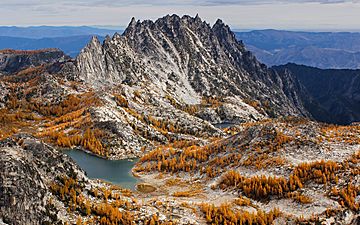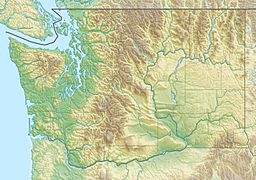The Temple (Washington) facts for kids
Quick facts for kids The Temple |
|
|---|---|

The Temple seen from Little Annapurna
|
|
| Highest point | |
| Elevation | 8,292 ft (2,527 m) |
| Prominence | 772 ft (235 m) |
| Geography | |
| Location | Chelan County Washington state, U.S. |
| Parent range | Stuart Range Wenatchee Mountains Cascade Range |
| Topo map | USGS Enchantment Lakes |
| Type of rock | Granite |
| Climbing | |
| First ascent | 1942 by Fred Beckey |
| Easiest route | class 5.3 Climbing |
The Temple is a tall mountain in Washington state, reaching 8,292-foot (2,527-metre) high. It's made of a strong rock called granite. This mountain is found in a beautiful area called The Enchantments, which is part of the Alpine Lakes Wilderness. The Temple belongs to the Stuart Range, a smaller group of mountains within the larger Cascade Range.
The closest taller mountain is Enchantment Peak, about 1.55 miles (2.49 km) to the west. The nearest town is Leavenworth, about 8 miles (13 km) to the northeast. The Temple is famous for its many tall, pointy rock formations, called spires. Some of these spires have cool names like The High Priest, The Boxtop, Flake Tower, and the well-known Prusik Peak. The very top of the mountain is called Mt. Temple. Water from the mountain flows into Snow Creek, which then joins Icicle Creek.
Mountain Weather
Most of the weather that affects The Temple comes from the Pacific Ocean. These weather systems travel east towards the Cascade Range. When they hit the tall mountains, the air is forced upwards. This causes the moisture in the air to fall as rain or snow onto the Cascades. This process is called Orographic lift.
Because of this, the Cascade Mountains get a lot of rain and snow, especially in winter. Winters are usually cloudy. However, in summer, high-pressure systems over the Pacific Ocean often bring clear skies and sunshine to the mountains.
How The Temple Was Formed
The Alpine Lakes Wilderness, where The Temple is located, has very rugged land. It features sharp peaks, long ridges, deep valleys carved by glaciers, and huge granite walls. There are also more than 700 mountain lakes scattered around. All these amazing features were created by powerful geological events that happened millions of years ago.
The Cascade Range began forming millions of years ago. This happened when the North American Plate slowly moved over the Pacific Plate. This movement caused many volcanic eruptions over a long time. Also, small pieces of the Earth's crust, called terranes, helped build the North Cascades about 50 million years ago.
About two million years ago, during the Pleistocene period, huge sheets of ice called glaciers moved across the land. These glaciers carved out the valleys and left behind piles of rock. The last glaciers in the Alpine Lakes area started melting about 14,000 years ago. They had completely moved north of the Canada–US border by 10,000 years ago. The "U"-shaped valleys you see today were formed by these glaciers. The combination of land being pushed up (called uplift) and cracks in the Earth's crust (called faulting) along with the glaciers, created the tall peaks and deep valleys of the Alpine Lakes Wilderness.
 | Delilah Pierce |
 | Gordon Parks |
 | Augusta Savage |
 | Charles Ethan Porter |



